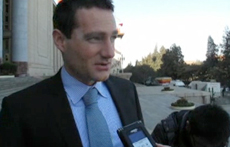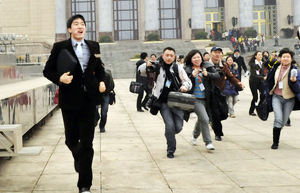Urban hukou or rural land? Migrant workers face dilemma
(Xinhua)
Updated: 2010-03-10 16:17
BEIJING - Hu Xiaoyan, one of China's first three national legislators who represent the country's millions of migrant workers, has had her official residency status transferred from her rural hometown in Sichuan to the city she now works in Guangdong.
To become an urban citizen, Hu had to surrender her farm plot back in her hometown.
For this reason many migrant workers who have the opportunity to change their residency status, or hukou, to become urban citizens have second thoughts. They do not want to give up their small plots of land.
Deputies from southern Guangdong Province to the annual session of the National People's Congress (NPC), the top legislature, said at their panel discussion that local municipality's policy to attract migrant workers to settle down was not always welcomed by all the new-comers.
Guangdong's Zhongshan City has introduced a series of local policies and regulations to attract migrant workers to settle down by offering urban residency status.
According to Li Qihong, an NPC deputy and Zhongshan's mayor, more than 30,000 migrant workers working in the city are eligible to become urban citizens, but less than 200 of them have changed their hukou in 2009.
Chinese rural residents have been migrating to towns and cities since the late 1970s when the opening up and reform policy meant less farmers were needed to work on the land.
Currently, about 150 million migrant workers in cities, mainly working as temporary building labors and in the service industry, miss out on benefits linked to urban hukou, regarding education, housing and health among others.
"Many migrant workers are not willing to give up their land. Although the local government is improving the social security system, many migrant workers believe if all else fails they can still go back and make a living from the land," Hu said.
However, if those migrant workers do not obtain an urban hukou, they must pay much more for their children's schooling and their medical fees.
As the central government is determined to narrow the development gap between rural and urban populations by accelerating the country's urbanization process, the migrant workers have to make a decision about their hukou.
Premier Wen Jiabao has vowed in his work report during the ongoing NPC session that the government will promote the urbanization and construction of rural communities, propel reform of the hukou system by loosening requirements for migrants to obtain residency status in medium and small cities and towns.
The migrant workers' hesitation in giving up their rural residence status is well understood by Zhai Weidong, the Party secretary of Chengliu town in Jiyuan City, central Henan Province, a major source of migrant workers.
Zhai told Xinhua rural hukou holders have increasing benefits as the central government and local authorities are giving them more subsidies and many other benefits .
Jiao Tianyin, a villager of Huling in Chengliu, said that one farmer can get subsidies of 100 yuan for one mu of farmland (about 0.067 hectares) each year, 30 to 50 yuan for agricultural machinery. He may get as much as 4,000 yuan as a bonus at the year end and other rewards such as rice and cooking oil.
"If I become an urban citizen and become unemployed, I will have no income and feel depressed. But if I have land, at least I can always make a living," Jiao said.
"The dilemma exists because people from rural communities want some kind of insurance if they become unemployed in the city," Zhai said.
Prof. Hu Xingdou, a hukou expert with the Beijing Institute of Technology, said the government should provide complete social security services for those migrant workers. As well, the government should enhance education and training for them to improve their means of livelihood.
Prof. Hu suggested that migrant workers should not have to immediately surrender their land after getting their urban hukou, but Hu Xiaoyan said the rural workers who have settled down in cities should return the land back to maintain fair circulation.
Kong Xiangzhi, deputy mayor of Jiyuan, said job opportunities should be considered as the most pressing issue for the authorities to promote urbanization.







